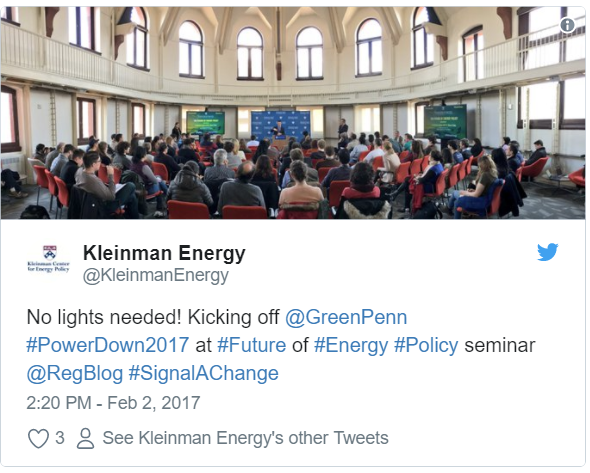
5 Ways to Power Down
Did you know that the average member of the Penn community consumes over 15,000 kWh of energy in a given calendar year? Energy conservation saves energy, money, and emissions.
This week, we are powering down at Penn. Every year, the Power Down Challenge encourages Penn students, faculty, and staff to reduce energy usage and take time to understand how energy issues interact with our day-to-day lives. Last year, this initiative saved 282,350 kWh in a 24-hour period, reducing campus energy consumption by 11.4%.
The average member of the Penn community consumes over 15,000 kWh of energy in a given calendar year. That is enough power to run a TV for 18 years straight or charge an iPhone 6 for over 4,000 years.
Penn’s Power Down effort is part of a larger effort to implement Penn’s Climate Action Plan 2.0. This plan includes initiatives in academia, utilities, waste, transportation, and more. Since the launch of the Climate Action Plan in 2009, Penn has seen a 140% increase in sustainability-related courses, decreased carbon emissions by over 13%, decreased landfill waste by 5%, and half of Penn faculty and staff now rely on sustainable transportation to commute to campus.
Energy conservation and energy efficiency are both important pieces to creating a less energy intensive workplace. Energy efficiency deals with upgrades to buildings and technologies that reduce the amount of energy needed to operate. For example, if you improve the efficiency of a refrigerator, the refrigerator uses less energy but it is not necessarily used less frequently. Sometimes energy efficiency measures result in a “rebound effect,” when consumers offset savings in energy by purchasing larger homes or appliances.
Aside from the initial purchase, energy efficiency has the benefit of not requiring any lifestyle change on the part of the consumer. Energy conservation, however, requires daily effort—such as turning off lights and lowering thermostats.
An energy efficient appliance will operate normally, with no restrictions on use. Energy conservation necessitates behavioral changes, which are more difficult to regulate or encourage. In an effort to conserve energy, the consumer must adjust to changes such as less lighting or a colder office.
How can you help conserve energy? There are a few lifestyle changes that you can make, in both the home and the office, that can make a big difference:
- Keep the lights off. Use natural light whenever possible and turn off lights in rooms when they are not being used. Studies show that natural lighting can help decrease headaches, stress, blood pressure, fatigue, and worker error.
- Monitor your thermostat. Keep the heat and AC set at a recommend 68°F in the winter and 78°F in the summer. Every degree decreased in heating results in 5% reduction in energy costs.
- Be laundry smart. Wash clothes in cold water and hang them dry. Water heating consumes about 90% of the energy used to wash a load of clothes, and Americans spend $9 billion in electricity to dry their clothes.
- Unplug your devices. Your devices still use energy, even if they are turned off. Save energy by unplugging devices or appliances you are not using.
- Use window shades. Open shades in the winter to let in warm sun rays. Close them in the winter to insulate from the cold.
There is no doubt that there are ways we could all use energy a little smarter. Whether at Penn or at home, take time to consider where you can reduce your use.
Mollie Simon
Senior Communications SpecialistMollie Simon is the senior communications specialist at the Kleinman Center. She manages the center’s social media accounts, drafts newsletters and announcements, writes and publishes content for our website, and regularly posts to our blog.


